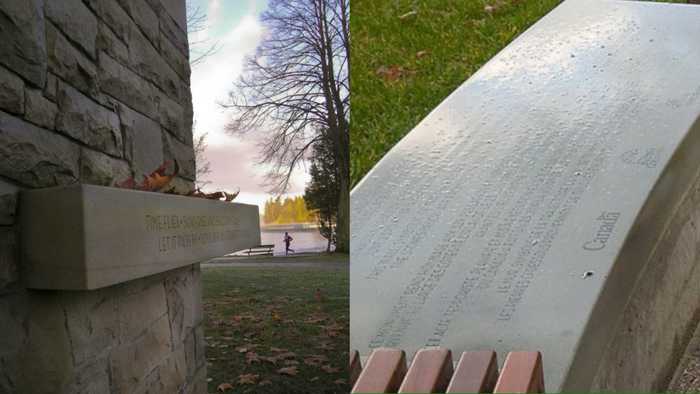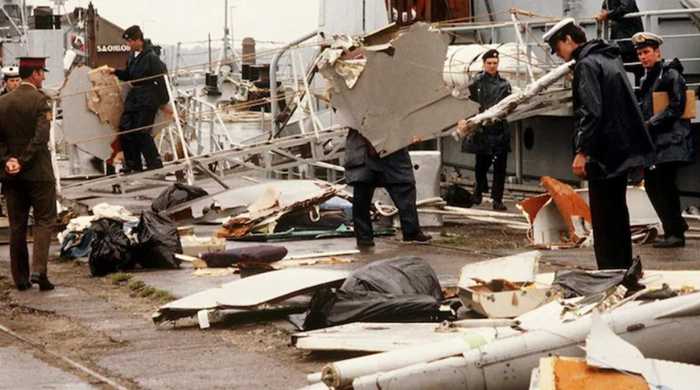Published 16:31 IST, June 19th 2024
How Air India Flight 182 (Kanishka) Was Bombed By Khalistani Terrorists On June 23, 1985
Air India Flight 182, also known by its flight name Kanishka, was bombed mid-air by terrorists on June 23, 1985. Here's a breakdown of the events:
- India News
- 6 min read
New Delhi: Just days ahead of the 39th anniversary the 1985 terrorist attack on Air India Flight 182, India lodged a strong protest against Canada and reminded the world of the bombing of Air India 'Kanishka' Flight 182 in which 329 people, including 86 children, were killed.
The Canadian Parliament observed a minute's silence to commemorate the death anniversary of the Khalistani terrorist Hardeep Singh Nijjar in the House of Commons. Nijjar was shot dead outside a gurdwara in Surrey, British Columbia, on June 18, 2023. Canadian police have arrested four Indian nationals in connection with his death.
And, in sharp response to the Canadian government honouring Nijjar, the Consulate General of India in Vancouver, reminded the world of the Kanishka bombing, the most heinous terror-related air disasters in the history of civil aviation.
"India stands at the forefront of countering the menace of terrorism and works closely with all nations to tackle this global threat," the Consulate General of India in Vancouver posted on X on Tuesday.
The Consulate General of India has also planned a memorial service to mark the anniversary of the bombing. The memorial is scheduled on June 23 at the Air India Memorial at Stanley Park's Ceperley Playground area in Vancouver at 1830 hours local time.
 "23 June 2024 marks the 39th Anniversary of the cowardly terrorist bombing of Air India flight 182 (Kanishka), in which 329 innocent victims, including 86 children, lost their lives in one of the most heinous terror-related air disasters in the history of civil aviation," it said.
"23 June 2024 marks the 39th Anniversary of the cowardly terrorist bombing of Air India flight 182 (Kanishka), in which 329 innocent victims, including 86 children, lost their lives in one of the most heinous terror-related air disasters in the history of civil aviation," it said.
The Consulate encouraged members of the Indian Diaspora to join the event in a show of solidarity against terrorism.
The 1985 terrorist attack on Air India Flight 182:
The Flight Path:
Air India Flight 182 was a passenger flight travelling from Montreal to London, with planned onward connections to Delhi and Bombay (now Mumbai).
The Bombing:
A bomb planted by Khalistani terrorist groups and Babbar Khalsa detonated on board the flight, causing it to disintegrate over the Atlantic Ocean off the coast of Ireland. The bomb was in a suitcase that was transferred to the flight even though the ticket holder had not boarded. The Air India 'Kanishka' Flight 182 exploded 45 minutes before it was to have landed at London's Heathrow Airport on June 23, 1985, killing all 329 people on board, including a large number of Canadian citizens of Indian origin. The victims included 268 Canadian citizens, mostly of Indian origin, and 24 Indians. Only 131 bodies were retrieved from the sea.
As per a leading English daily's report, while the flight was still in the air, another explosion at Tokyo's Narita airport killed two Japanese baggage handlers. Investigators later said that this bomb was linked to the attack on Flight 182 and intended for another Air India flight to Bangkok but it exploded prematurely.
The Investigation:
The bombing was blamed on Sikh militants in retaliation to 'Operation Bluestar' to flush out militants from the Golden Temple in 1984. It was linked to Khalistani separatist movements in Canada. The investigation was complex and lengthy, but ultimately led to convictions.
Several months after the incident, Talwinder Singh Parmar, the leader of an terrorist group known as Babbar Khalsa, which is now banned in Canada and India, along with Inderjit Singh Reyat, an electrician, were arrested by the Royal Canadian Mounted Police (RCMP) on charges related to weapons, explosives, and conspiracy.
However, the case against Parmar, whom India had attempted to extradite from Canada in the early 1980s without success, was weak, leading to his release. Investigators now assert that Parmar, who was killed by police in India in 1992, was the mastermind behind the attack.
In 2000, police arrested Ripudaman Singh Malik, a wealthy Vancouver businessman and Ajaib Singh Bagri, a mill worker from British Columbia, on multiple charges, including mass murder and conspiracy. However, in 2005, following an extensive trial lasting nearly two years, both men were acquitted of all charges. The judge cited factual errors and credibility issues with key witnesses who had testified against them.
Inderjit Singh Reyat was the sole individual convicted in relation to one of the most devastating aviation terror incidents. He received a 10-year prison sentence in the UK in 1991 for his role in the Japan bombing. In 2003, he pleaded guilty in a Canadian court to manslaughter related to the Flight 182 bombing and was sentenced to an additional five years in prison. He was later convicted of perjury during the trial of Malik and Bagri, resulting in an additional jail term.
In 2016, Reyat was released from a Canadian prison after serving two-thirds of a nine-year sentence. The following year, he was granted permission to leave a halfway house and reside wherever he chose, a decision that drew criticism from some experts.
The Tragedy:
The Air India Flight 182 bombing remains the worst terrorist attack in aviation history and a dark moment. It tragically took the lives of innocent people and continues to be a source of pain for the families of the victims. The bombing have consistently stirred painful memories in India. Although the majority of the victims were Canadian citizens of Indian origin with relatives in India, the prevailing sentiment in the country is that justice has not been adequately served for the victims.
Amarjit Bhinder, whose husband served as the co-pilot on the Air India flight, expressed to the media that Indian families affected by the bombing felt "neglected and left out" at the time. Over the years, families of the deceased have voiced their profound sorrow and grief.
India-Canada Ties
The memorial service hosted by India comes amid strain in India's ties with Canada over the issue of Khalistan terrorists after Canadian Prime Minister Justin Trudeau alleged in September last year of the "potential" involvement of Indian agents in the killing of Hardeep Singh Nijjar, a designated Sikh terrorist. India has dismissed Trudeau's allegations as “absurd and motivated”.
India has been maintaining that the main issue between the two countries is that of Canada giving space to pro-Khalistan elements operating from Canadian soil with impunity.
India has repeatedly conveyed its "deep concerns" to Canada and New Delhi expects Ottawa to take strong action against those elements.
Updated 17:49 IST, June 19th 2024
